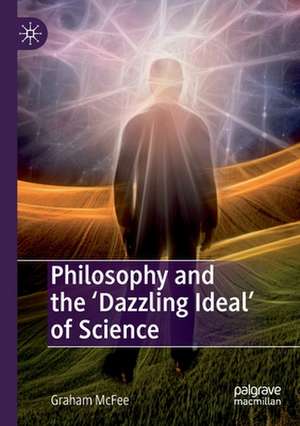Philosophy and the 'Dazzling Ideal' of Science
Autor Graham McFeeen Limba Engleză Paperback – 6 sep 2020
In his defense of philosophy (and its truth-claims), McFee shows that rejecting such scientism is not automatically anti-scientific, and that it permits granting to natural science (properly understood) its own truth-generating power. Further, McFee argues for contextualism in the project of philosophy, and sets aside the pervasive(and pernicious) requirement for exceptionless generalizations while relating his account to interconnections between the concepts of person, substance, agency, and causation.
| Toate formatele și edițiile | Preț | Express |
|---|---|---|
| Paperback (1) | 447.30 lei 6-8 săpt. | |
| Springer International Publishing – 6 sep 2020 | 447.30 lei 6-8 săpt. | |
| Hardback (1) | 524.24 lei 6-8 săpt. | |
| Springer International Publishing – 6 sep 2019 | 524.24 lei 6-8 săpt. |
Preț: 447.30 lei
Nou
Puncte Express: 671
Preț estimativ în valută:
85.64€ • 89.18$ • 71.06£
85.64€ • 89.18$ • 71.06£
Carte tipărită la comandă
Livrare economică 13-27 februarie
Preluare comenzi: 021 569.72.76
Specificații
ISBN-13: 9783030216771
ISBN-10: 3030216772
Pagini: 338
Ilustrații: XVII, 338 p.
Dimensiuni: 148 x 210 x 27 mm
Greutate: 0.43 kg
Ediția:1st ed. 2019
Editura: Springer International Publishing
Colecția Palgrave Macmillan
Locul publicării:Cham, Switzerland
ISBN-10: 3030216772
Pagini: 338
Ilustrații: XVII, 338 p.
Dimensiuni: 148 x 210 x 27 mm
Greutate: 0.43 kg
Ediția:1st ed. 2019
Editura: Springer International Publishing
Colecția Palgrave Macmillan
Locul publicării:Cham, Switzerland
Cuprins
Chapter One: Introductory — A still point in a turning world?.- Chapter Two: Persons as Agents: The Possibility of Genuine Action.- Chapter Three: What Persons Are: Identity, Personal Identity and Composition.- Chapter Four: What Persons are Not: Causality, Minds and the Brain.- Chapter Five: Evolutionary Explanation in Psychology: Not an Issue for Philosophy?.- Chapter Six: Persons, Artificial Intelligence, and Science Fiction Thought-Experiments.- Chapter Seven: Considerations of Exceptionlessness in Philosophy: or, ‘Everything … ‘.- Chapter Eight: Philosophy without Exceptionlessness.- Chapter Nine: Conclusion: The Place of Reason.
Notă biografică
Graham McFee is Emeritus Professor of Philosophy at the University of Brighton, UK, and a member of the Philosophy Department at California State University Fullerton. He has lectured and published nationally and internationally on, especially, the philosophy of Wittgenstein and the aesthetics of dance.
Textul de pe ultima copertă
Recent decades have seen attacks on philosophy as an irrelevant field of inquiry when compared with science. In this book, Graham McFee defends the claims of philosophy against attempts to minimize either philosophy’s possibility or its importance by deploying a contrast with what Wittgenstein characterized as the “dazzling ideal” of science. This ‘dazzling ideal’ incorporates both the imagined completeness of scientific explanation—whereby completing its project would leave nothing unexplained—and the exceptionless character of the associated conception of causality. On such a scientistic world-view, what need is there for philosophy?
In his defense of philosophy (and its truth-claims), McFee shows that rejecting such scientism is not automatically anti-scientific, and that it permits granting to natural science (properly understood) its own truth-generating power. Further, McFee argues for contextualism in the project of philosophy, and sets aside the pervasive(and pernicious) requirement for exceptionless generalizations while relating his account to interconnections between the concepts of person, substance, agency, and causation.
In his defense of philosophy (and its truth-claims), McFee shows that rejecting such scientism is not automatically anti-scientific, and that it permits granting to natural science (properly understood) its own truth-generating power. Further, McFee argues for contextualism in the project of philosophy, and sets aside the pervasive(and pernicious) requirement for exceptionless generalizations while relating his account to interconnections between the concepts of person, substance, agency, and causation.
Caracteristici
Defends the possibility of philosophy against a prevalent scientism Presents a vision of philosophy that does not presuppose a 'dazzling ideal' associated with science Explores the conditions for the possibility of philosophy
